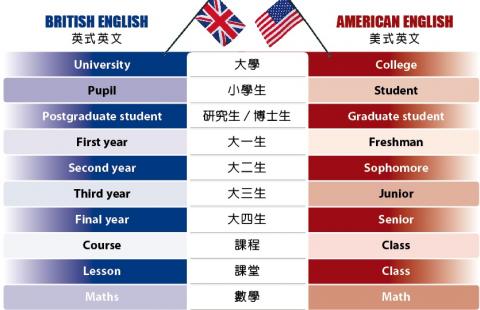There are many differences between American and British English on the subject of education. Here are some of them.
In the UK, students go to a university for an academic degree and to a college for more skills-based vocational training; in US English, college also refers to a university in which one gets their bachelor’s degree.
In the UK, a student is someone studying in a college or university, while a child in elementary — or primary — school is called a pupil. In the US, a student is anyone studying, from elementary school up through university. Someone in the US who has completed their bachelor’s degree and is pursuing a further degree is called a graduate student; in British English, the term is postgraduate student. The system used in the US to refer to the four years as an undergraduate — freshman, sophomore, junior and senior — is not used in the UK, where they simply say first/second/third and final year student.

In both countries, the word “class” refers to the unit of people you are studying with (as in, “I was in the same class as your brother in senior high school”). In the US, a class is also a course of instruction in a given subject (as in, “I’m taking a class in math”) but in the UK this would be called a course (“I’m taking a course in maths”). The idea of class collectively referring to every student graduating in a certain year (“I was in the class of 1997”) does not exist in the UK.
Finally, in the US, class is the specific period during which you are taught (“What time is your math class today?”) but in the UK they would use lesson for this (“What time is your maths lesson?”).
(Paul Cooper, Taipei Times)

Photo: Wikimedia Commons
照片:維基共享資源
美式英文和英式英文的教育用語有許多差異,此處介紹幾個例子。
在英國,學生到「university」(大學)去攻讀學位,而到「college」(學院)去接受比較屬於技能方面的職業訓練。在美式英文中,「college」也指可修讀學士學位的大學。
在英國,「student」(學生)是指在「university」或「college」就讀的人,而上小學──「elementary school」(或「primary school」)的孩子則稱為「pupil」(小學生)。在美國,從小學到大學的學生都可稱為「student」。已獲學士學位並繼續深造的學生,在美國稱為「graduate student」(研究生∕博士生),而英式英文則是說「postgraduate student」。美國稱呼大一生至大四生的用語分別是「freshman」、「sophomore」、「junior」、「senior」,但英國並未採用這套用語,而只是稱為「first year student」、「second year student」、「third year student」,以及「final year student」。
在英、美兩國,「class」都是指「班級」──例如,「I was in the same class as your brother in senior high school.」(我高中和你哥哥同班)。在美國,「class」也是一門課的教學課程──例如,「I’m taking a class in math」(我修數學課),但在英國則是用「course」這個字──例如,「I’m taking a course in maths」。美國的「class」也有「屆」的意思──例如,「I was in the class of 1997」(我是一九九七級/一九九七年畢業的一屆),但在英國並沒有這樣的用法。
最後,「class」在美國也指上課的特定時段──例如「What time is your math class today?」(你今天幾點上數學課?),但在英國則是用「lesson」這個字──「What time is your maths lesson?」。
(台北時報林俐凱譯)

In an effort to fight phone scams, British mobile phone company O2 has introduced Daisy, an AI designed to engage phone con artists in time-wasting conversations. Daisy is portrayed as a kindly British granny, exploiting scammers’ tendency to target the elderly. Her voice, based on a real grandmother’s for authenticity, adds to her credibility in the role. “O2” has distributed several dedicated phone numbers online to direct scammers to Daisy instead of actual customers. When Daisy receives a call, she translates the scammers’ spoken words into text and then responds to them accordingly through a text-to-speech system. Remarkably, Daisy

Bilingual Story is a fictionalized account. 雙語故事部分內容純屬虛構。 Emma had reviewed 41 resumes that morning. While the ATS screened out 288 unqualified, she screened for AI slop. She could spot it a mile away. She muttered AI buzzwords like curses under her breath. “Team player.” “Results-driven.” “Stakeholder alignment.” “Leveraging core competencies.” Each resume reeked of AI modeling: a cemetery of cliches, tombstones of personality. AI wasn’t just changing hiring. It was draining the humanity from it. Then she found it: a plain PDF cover letter. No template. No design flourishes. The first line read: “I once tried to automate my

Every May 1, Hawaii comes alive with Lei Day, a festival celebrating the rich culture and spirit of the islands. Initiated in 1927 by the poet Don Blanding, Lei Day began as a tribute to the Hawaiian custom of making and wearing leis. The idea was quickly adopted and officially recognized as a holiday in 1929, and leis have since become a symbol of local pride and cultural preservation. In Hawaiian culture, leis are more than decorative garlands made from flowers, shells or feathers. For Hawaiians, giving a lei is as natural as saying “aloha.” It shows love and

1. 他走出門,左右看一下,就過了馬路。 ˇ He walked outside, looked left and right, and crossed the road. χ He walked outside and looked left and right, crossed the road. 註︰並列連接詞 and 在這句中連接三個述語。一般的結構是 x, y, and z。x and y and z 是加強語氣的結構,x and y, z 則不可以。 2. 他們知道自己的弱點以及如何趕上其他競爭者。 ˇ They saw where their weak points lay and how they could catch up with the other competitors. χ They saw where their weak points lay and how to catch up with the other competitors. 註:and 一般連接同等成分,結構相等的單詞、片語或子句。誤句中 and 的前面是子句,後面是不定詞片語,不能用 and 連接,必須把不定詞片語改為子句,and 前後的結構才相等。 3. 她坐上計程車,直接到機場。 ˇ She took a cab, which took her straight to the airport. ˇ She took a cab and it took her straight